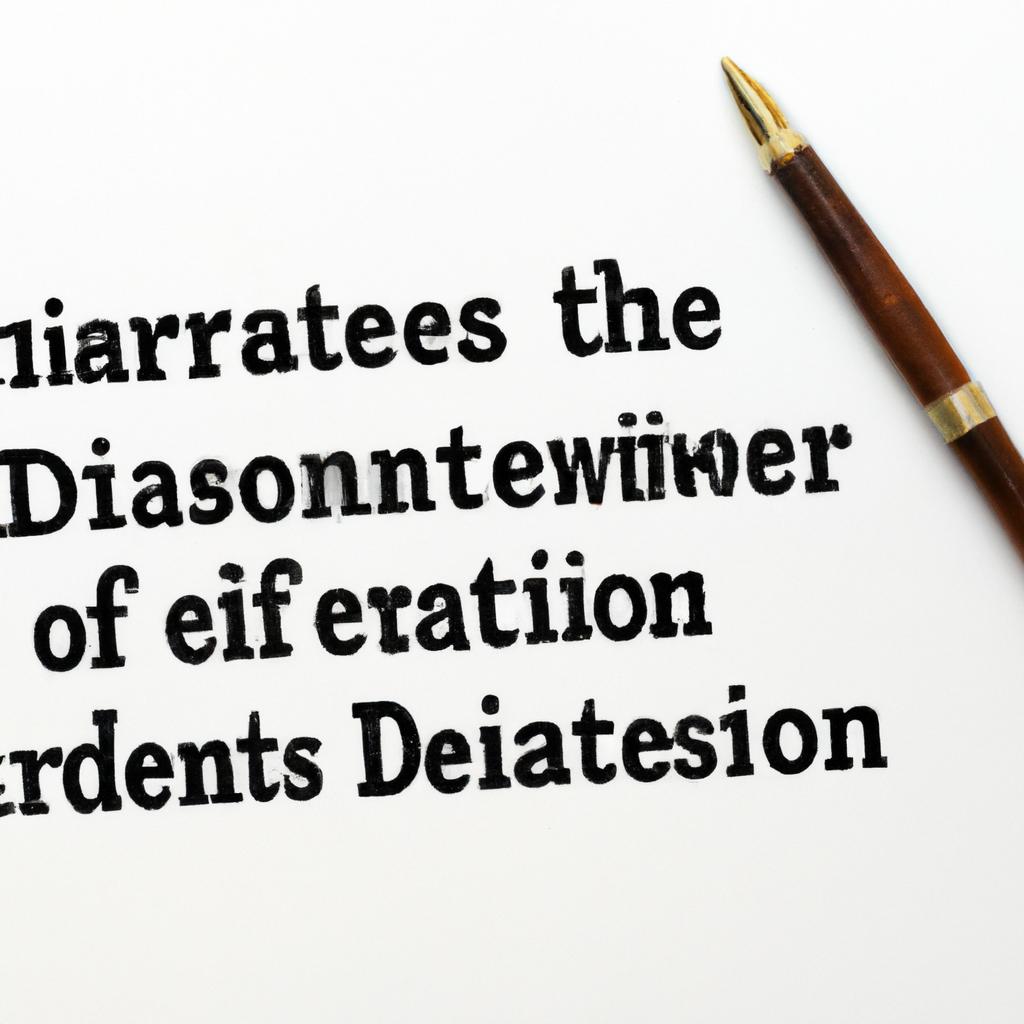As the legal concept of trust administration continues to evolve and adapt within the complex landscape of estate law, it is crucial for individuals to understand the extent of power vested in a trustee. From managing assets to making critical decisions regarding the distribution of wealth, the role of a trustee carries significant weight and responsibility. In this comprehensive guide, we will delve into the intricate realm of trust administration, exploring the various powers that a trustee possesses and the implications of their actions. Trust us at Morgan Legal Group to provide seasoned insight and guidance on this intricate subject matter, as we navigate you through the nuanced world of estate planning and trust management.
Trustee Powers and Responsibilities in Estate Planning
As a trustee in estate planning, you hold a position of great responsibility and power. It is crucial to understand the scope of your duties and the extent of the authority you have been granted. Here are some key powers and responsibilities that trustees typically have:
- Manage assets: Trustees have the authority to manage and invest the assets of the trust for the benefit of the beneficiaries.
- Distribute assets: Trustees are responsible for distributing the trust assets according to the terms of the trust document.
- Make decisions: Trustees have the power to make decisions on behalf of the trust, including financial and legal decisions.
It is important to approach your role as a trustee with diligence and care, as you are tasked with safeguarding the interests of the beneficiaries and carrying out the wishes of the trust creator. By understanding your powers and responsibilities, you can effectively navigate the complexities of estate planning and ensure the smooth administration of the trust.

Understanding the Authority of a Trustee in Managing Trust Assets
As a trustee, you are entrusted with the important responsibility of managing trust assets for the benefit of the trust’s beneficiaries. It is essential to understand the scope of your authority and the duties that come with this role. Here are some key powers that a trustee typically has:
- Investment Authority: Trustees have the power to invest trust assets prudently, taking into account the best interests of the beneficiaries.
- Distribution Authority: Trustees may have the discretion to distribute income or principal from the trust to the beneficiaries according to the terms of the trust document.
- Administrative Authority: Trustees are responsible for managing the day-to-day administration of the trust, including keeping accurate records, filing tax returns, and providing reports to beneficiaries.
| Power | Description |
|---|---|
| Investment Authority | Ability to invest trust assets prudently |
| Distribution Authority | Discretion to distribute income or principal to beneficiaries |
| Administrative Authority | Responsibility for day-to-day trust administration |

Navigating the Limitations and Discretion of a Trustee’s Decision-Making
In the realm of trust law, trustees play a crucial role in managing assets for the benefit of beneficiaries. However, there are limitations and discretion that trustees must navigate when making decisions. Understanding the extent of a trustee’s power is essential in ensuring that the trust operates effectively and in accordance with the wishes of the grantor.
Trustees have the power to make decisions regarding investments, distributions, and overall management of the trust. However, this power is not unlimited, and trustees must operate within the parameters set forth in the trust document and applicable state laws. It is important for trustees to exercise their discretion wisely and in the best interest of the beneficiaries. Being mindful of the following limitations and considerations can help trustees navigate their decision-making responsibilities effectively:
- Fiduciary Duty: Trustees have a fiduciary duty to act in the best interest of the beneficiaries.
- Trust Document: Trustees must adhere to the terms outlined in the trust document.
- State Laws: Trustees must comply with state laws governing trust administration.

Best Practices for Trustees to Fulfill Their Fiduciary Duties
Trusting a trustee with your assets is a crucial step in estate planning. Understanding the power a trustee holds is essential in ensuring your wishes are carried out effectively. A trustee has the authority to manage the assets held in a trust for the benefit of the beneficiaries. This includes making investment decisions, distributing income and principal, and ensuring that the terms of the trust are followed.
Furthermore, a trustee is responsible for acting in the best interests of the beneficiaries and must adhere to the terms outlined in the trust document. This fiduciary duty requires the trustee to exercise prudence, loyalty, and impartiality in their decision-making. Trustees are also tasked with keeping accurate records, providing regular reports to beneficiaries, and avoiding conflicts of interest. By following these best practices, trustees can fulfill their fiduciary duties effectively and ensure the trust operates smoothly.
Q&A
Q: What power does a trustee have?
A: A trustee has the power to manage and oversee assets and property held in a trust on behalf of the beneficiaries.
Q: Can a trustee make decisions without consulting the beneficiaries?
A: Yes, a trustee has the authority to make decisions regarding the trust without consulting the beneficiaries, as long as those decisions are in the best interest of the trust.
Q: What are some examples of powers that a trustee may have?
A: Some powers that a trustee may have include the power to invest trust funds, distribute assets to beneficiaries, and make decisions regarding the management of trust property.
Q: Is a trustee required to act in the best interest of the beneficiaries?
A: Yes, a trustee is legally obligated to act in the best interest of the beneficiaries and to fulfill their fiduciary duties with care, loyalty, and impartiality.
Q: What happens if a trustee abuses their power?
A: If a trustee abuses their power or acts in a way that is harmful to the beneficiaries, they may be removed from their position and held personally liable for any losses incurred by the trust.
Insights and Conclusions
In conclusion, understanding the powers and responsibilities of a trustee is essential for ensuring effective management and protection of assets. By acting in the best interests of the beneficiaries, a trustee holds the power to make important decisions that can greatly impact the trust’s outcome. It is important for trustees to approach their role with diligence, integrity, and a thorough understanding of their legal obligations. As stewards of trust assets, trustees wield significant power that should be wielded wisely and ethically. The role of a trustee is not to be taken lightly, but rather embraced with a sense of duty and responsibility towards the beneficiaries and the trust itself. By recognizing and leveraging their power in a positive and transparent manner, trustees can fulfill their role with honor and ensure the preservation and growth of the trust for future generations.
 What Power Does a Trustee Have?
What Power Does a Trustee Have?
Are you considering appointing a trustee to manage your estate or trust? Or perhaps you’ve been named as a trustee and are unsure of the extent of your responsibilities and power. In either case, understanding the role and power of a trustee is crucial for a successful and efficient management of your estate or trust.
In this article, we’ll delve into the details of what exactly a trustee’s role entails, their powers and limitations, and the importance of selecting the right trustee for your estate or trust.
What is a Trustee?
A trustee is an individual or institution appointed to manage a trust on behalf of the beneficiaries. A trust is a legal arrangement where a trustee holds assets on behalf of one or more beneficiaries, who are entitled to receive income or the capital from the trust.
Trustees have a fiduciary duty to manage the trust in the best interest of the beneficiaries, and their role is crucial in the functioning of a trust.
What are the Powers of a Trustee?
1. Managing the Trust Assets
The primary responsibility of a trustee is to effectively manage the trust assets. This includes making investment decisions, monitoring the performance of investments, and ensuring that the assets are protected and well-maintained.
2. Distributing Trust Income and Capital
Trustees also have the power to distribute trust income and capital to the beneficiaries. The trust document will outline the specific conditions and requirements for distributions, and it is the trustee’s responsibility to ensure these are followed.
3. Making Decisions in the Best Interest of the Beneficiaries
Trustees have a fiduciary duty to act in the best interest of the beneficiaries at all times. This means making decisions that will benefit the beneficiaries and not their personal interests. A trustee must also exercise their powers in a responsible and reasonable manner, taking into account the present and future needs of the beneficiaries.
4. Managing Taxes and Expenses
Trustees are responsible for managing any taxes and expenses related to the trust. This includes preparing tax returns, paying any taxes owed, and ensuring that the trust assets are not unnecessarily depleted.
5. Hiring Professionals
Trustees have the power to hire professionals to assist them in managing the trust, such as attorneys, accountants, and financial advisors. This can be especially useful when the trustee is not well-versed in managing trusts or when complex financial matters arise.
6. Resolving Conflicts
As the manager of the trust, a trustee has the power to resolve any conflicts that may arise between the beneficiaries or with other parties involved in the trust. This can include mediating disputes or taking legal action if necessary.
What are the Limitations of a Trustee?
1. Following the Terms of the Trust
A trustee’s powers and actions are limited to the instructions and terms outlined in the trust document. They must adhere to these instructions, and any actions taken outside of the trust’s terms can result in legal consequences.
2. Acting in Good Faith
Trustees are required to act in good faith and do what is best for the beneficiaries. If the beneficiaries believe that the trustee is not acting in their best interest, they can take legal action to remove the trustee.
3. Managing the Trust in a Reasonable Manner
Trustees must manage the trust in a reasonable and responsible manner. This includes making reasonable investment decisions and abiding by any laws or regulations that govern the trust.
4. Avoiding Conflicts of Interest
Trustees must avoid any actions that may create a conflict of interest between themselves and the trust or the beneficiaries. This can include avoiding self-benefit or manipulating the trust for personal gain.
5. Acting Within the Limits of the Law
Trustees must act within the boundaries of the law and follow all legal requirements related to trusts and their management. Failure to do so can result in legal consequences.
Selecting the Right Trustee
Selecting the right trustee for your trust is crucial, as they will have a significant impact on the management and distribution of your assets. Here are some important factors to consider when choosing a trustee:
– Trustworthiness and integrity
– Financial knowledge and experience
– Availability and willingness to take on the responsibility
– Understanding of legal and fiduciary duties
– Availability of support staff and resources
– Communication and interpersonal skills
Practical Tips for Trustees
If you have been named as a trustee, here are some practical tips to help you effectively manage the trust:
– Familiarize yourself with the trust document and any applicable laws or regulations.
– Keep detailed and accurate records of all trust activities and transactions.
– Communicate regularly with the beneficiaries and keep them informed of the trust’s progress.
– Seek professional advice when necessary.
– Act with caution and always consider the best interest of the beneficiaries.
In Conclusion
Trustees play a vital role in the management and success of trusts. They have various powers and responsibilities, but they are also limited to what is outlined in the trust document and the law. Selecting the right trustee is crucial for the efficient management of a trust, and if you have been named as a trustee, being aware of your duties and acting with integrity and caution is key to fulfilling your role successfully.


